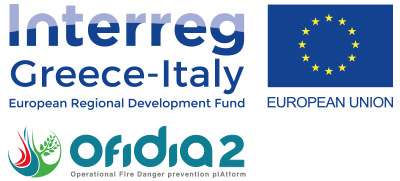Project Team

Prof. Patrizia Guida

Education, Europe and International Cooperation, Municipality of Lecce: “We are glad to take part in Ofidia2. The Municipality of Lecce will work to involve the schools in several activities related to the project. We will set up a contest for kids of the middle school. It will be a way to exploit the potential of this scientific project also to enhance the awareness and participation of young generations on topics highly relevant to our community. For these reasons, we will also carry out a communication campaign on wildfire prevention”.
Prof. Giovanni Aloisio

CMCC Foundation (Project coordinator), Italy: “Ofidia2 primarily capitalizes on what was successfully made by the first Ofidia project. It is an evidence of how high-level scientific research can contribute to the dialogue with the stakeholders and with the society. This dialogue is pivotal to find solutions to complex topics that are critical for the Regions involved in the Programme. Technological infrastructures, such as the Supercomputing Centers, the advanced scientific knowledge, together with the collaboration with policy-makers and stakeholders, and the use of cutting-edge innovation technologies enhance a process which aims at benefiting the whole society”.
Prof. Stergios Anastasiadis

University of Ioannina, Greece: “The Greek partners are grateful for the support from the Interreg Greece-Italy 0214-2020 programme to approve the OFIDIA2 project. Based on the enormous expertise gathered from OFIDIA1 and the very positive feedback from the participating stakeholders, we are optimistic about delivering improved weather forecasts and even more powerful and flexible high-value tools to the regional and national authorities for the effective prevention and fighting of forest wildfires in the cross-border area.”
Gianfranco Gadaleta JS Coordinator

“Ofidia 2 belongs to the 41 projects funded under the first call of Interreg V-A Greece-Italy Programme. The 41 projects have a total funded budget of 53.600.000 euro and involve 191 partners among Regions, Municipalities, Universities, Chamber of Commerce, Research Centres, located in Puglia and in the 3 Greek Regions that participate in the Programme (Region of Epirus, Region of Ionian Islands and Region of Western Greece)”
Steering Committee

The Steering Committee is chaired by the LP and includes the Project Manager, one representative from each project partner (including LP) and WP Leaders. It is the ultimate decision-making body of the partnership and will have a formal accountability role for overseeing the project.
The OFIDIA Project Steering Committee is composed by:
• Prof. Giovanni Aloisio (CMCC) – Project Manager and WP1 Leader
• Prof. Stergios Anastasiadis (University of Ioannina) – WP2 Leader
• Dr. Maria Mirto (CMCC) – WP3 Leader
• Dr. Sandro Fiore (CMCC) – WP4 Leader
• Prof. Aris Bartzokas (University of Ioannina) – WP5 Leader
• Dr. Carmelo Calamia (Province of Lecce) – WP6 Leader
• Mr. Dimitrios Zikos (Decentralized Administration Of Epirus-Western Macedonia (DAFD)
• Eng. Francesco Luisi (Province of Bari)
Project Office

Set up by CMCC (the OFIDIA LP), the Project Office is composed of a Project Manager and a Financial Manager. It supports the decision-making body (Steering Committee) and the Scientific Advisory Body.
The OFIDIA Project Office is compsed by:
• Project Manager: Prof. Giovanni Aloisio (CMCC)
• Financial Manager: Dr. Laura Panzera (CMCC)
Scientific Advisory Board


